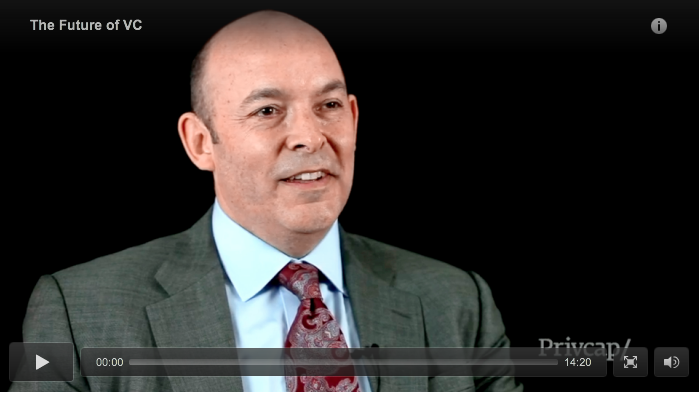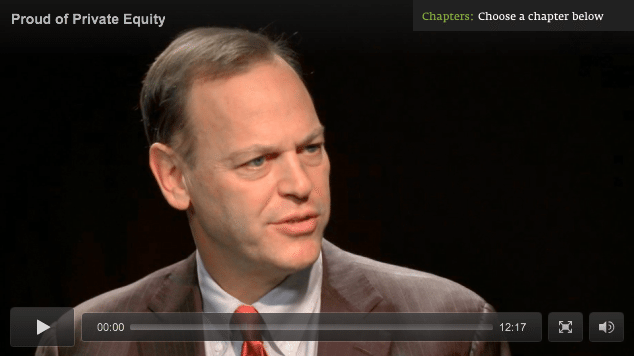Defining Growth Equity
Growth equity firms have been major players in private capital for a long time, and yet, positioned between the venture and buyout asset classes, many growth equity investors have long felt they “didn’t really have a home” with regard to regulator and public awareness, according to Bruce Evans, Managing Director of Boston-based Summit Partners.
In an exclusive interview with Privcap, Evans describes why he is helping the National Venture Capital Association (NVCA) to form a special growth equity group within the advocacy organization. The conversation begins with Evans’ definition of “growth equity” and how should be viewed and measured in an institutional portfolio. He explains why growth equity should be seen as a “natural extension of the venture capital business” and why it is troubling that growth equity seems to have ended up on the “wrong side of the line” in the eyes of US regulators. The conversation ends with Evans’ saying why he thinks the JOBS Act is a “great thing” for growing businesses.
Transcript Download Transcript
David Snow, Privcap: So today we’re joined by Bruce Evans, of Summit Partners. Bruce, welcome to Privcap today.
We’re going to be talking all about your specialty, which is growth equity. I think that people are throwing that term around a lot these days. It’s popular to be a growth equity investor. But I’d be very interested in your perspective about what exactly is growth equity, how is it distinct from buyouts or venture capital?
Bruce Evans, Summit Partners: Sure, happy to talk about it. Thanks. Thanks for asking the question.
As you probably know, I’ve been involved in growth equity for over 25 years. And the way I see it is that growth equity sits on the seam that exists between the venture business and the buyout business. It’s a natural extension of the venture capital business. And it starts at what you might describe as the late stages of venture capital.
It is a strategy that involves, fundamentally, finding businesses that have revenues, that have reached profitability, that are principally founder-owned, founder-managed, may not have had prior professional capital, have a capital need that could be for the company or could be to provide liquidity for shareholders. And are interested, the management group is interested in continuing with that business. So most, if not the large majority, of investments that growth equity firms make are minority interests in companies.
Snow: Well, from an investor’s perspective, who perhaps has an allocation to alternative investing or to alternative assets, how should they think about where growth equity fits into an overall portfolio devoted to the private markets?
Evans: Well, venture capital firms work with entrepreneurs to create and grow businesses. And a growth equity firm does the grow part. Some people would describe it as the private alternative to the public markets. It’s a place, if you’re an investor, to go find private investments that look like, and if successful, grow faster than a Russell 2000 type portfolio.
Snow: How about performance? What is expected from growth equity strategy that perhaps is also, again, distinct from buyouts or distinct from venture capital?
Evans: Yeah, there’s a couple things. I think one of the key parts about a growth equity strategy is, the way that a growth equity investor makes money is as a function of the growth of the business, its revenues or its earnings, and not as a function of financial engineering.
I think another key is, and I guess that it’s an extension of the financial engineering piece, is that a growth equity investment is either unlevered or is lightly levered. And when leverage is used, it’s used to enhance the return on equity, and not as a justification for a transaction.
And I think the final piece is that growth equity investors usually find themselves in positions as minority investors. And they have to work with entrepreneurs in a way where they convince and cajole as opposed to apply command and control to the way that businesses go forward.
Snow: Well, I want to ask you a bit about working with the entrepreneur and how that relationship can be successful, but just dwelling a bit longer on growth equity from the investor’s point of view, what’s the right way to benchmark it? So, for example, should the performance of a growth equity fund be compared to that of a buyout fund? And how can an investor understand whether a growth equity track record is good, excellent or not very impressive?
Evans: OK, so there are three ways that investors would look at a growth equity firm. The first is, they’d look at what’s the absolute IRR the fund, that the investment has produced? And, related to that, what’s the multiple of money on the investment that a fund has produced? And they make judgments about what’s an acceptable, just absolute, net IRR, back to the limited partner, or a net multiple of money back to the limited partner.
The second way is to benchmark. And the traditional way is to benchmark based on vintage year, like strategies. People often benchmark growth equity firms against late-stage venture strategies. Although I know, from my work on the National Venture Capital Association, that several of the firms that do benchmarking, that produce benchmarking data, are trying to develop growth equity oriented benchmarks. And so there’s not a perfect benchmark in existence right now for growth equity strategies. But I think that’s coming quickly, given the importance of this part of the industry.
And then, the third way to do it is just to compare the cash flows from a fund, a growth equity fund, to an index, say the Russell 2000. And really, what you want to do is see if there’s an acceptable spread, positive spread, between what the growth equity fund produces and what the same index, Russell 2000, over the same time frame, with the same cash flows, would have produced.
Snow: Well, let’s talk a bit about what you alluded to earlier, which is the relationship between the growth equity firm and the entrepreneur. From the entrepreneur’s point of view, why would they, certainly possibly they need capital to grow. But what else would they need from a private equity firm, from a growth equity firm? And what would your firm offer to them?
Evans: Well, you know, I think about companies as having five parts. They have their products. They participate in markets. There’s a management team. There’s a historical and projected financial performance. And then, from my perspective, there’s an investment opportunity. From their perspective, there’s a capital need.
With respect to the capital need, which is the place it all starts, it’s either about a company need to fund growth, a new product, an acquisition, or a shareholder need. A founder owns 100% of a business. It’s gotten quite substantial. That person looks at his or her own balance sheet and says, I’m really concentrated in this particular asset. I’d like to sell a piece of my ownership. I still want to run my business, but I want to sell a piece of my ownership, because it’s good to diversify.
That’s a typical thing that happens with companies as they start to think about justifying bringing in growth equity. They also, then, say well, I’m not ready to be a public company. There are lots of things you need to do, given the rules and regulations today. There’s expense associated with that. There are systems that need to be put in place. And I need some help to do those kinds of things. And so that’s also a driver.
But from a, just in a more general sense, the teams that we invest in tend to be incomplete. There’s a CEO but maybe there’s some missing parts and pieces.
We’re good at helping bring management teams together. The product sets, or the services that are offered, tend to be narrow. And we’re experienced in working with entrepreneurs to broaden those things and produce a broader set of products, a broader set of customers.
And the geographies that they operate in are often limited. We’ve got lots of experience in those types of expansions. And generally speaking, firms that are involved– again, I’ve been doing this for 25 years– with growth companies have experiences that are useful to people who run those companies.
Snow: Well let’s talk a bit about some of the big investment themes that are out there for firms like yours that invest in growing companies. I’m sure that there are a number of industries that are populated with firms at a certain stage of growth that need to get to the next level. But when you and I spoke earlier, you mentioned the idea of big data and how there’s a lot of opportunity in there, or at least a lot of companies that fit the profile of those that you seek after for investment. What’s going on in big data and what’s a way to invest in that, in your strategy?
Evans: Well let me start by saying that one of the key things about a growth equity strategy, as I said earlier, growth equity is an extension of venture capital. It’s an extension of those strategies. It’s the growth part of what a venture capitalist does.
And the venture industry has historically been very active in the technology space. The growth equity business, and people that pursue those strategies, are also extremely active in the technology sectors and are affected by trends in technology. And as we sit here today, in 2012, there are some great trends in place that are driving growth in businesses that are at a stage of development where companies have hit our part of the market. And big data is one of those places.
I might extend that and say that it has more to do with just that narrow word, big data, but everything that has to do with data flows, be it just pure data, be it video, the networks that those things flow across, mobile applications that are related there, too. There’s the whole cloud that’s effectively a big place where data is stored. There’s security that flows from there. And there are lots and lots of good trends.
And we’ve been very, very active, particularly since the middle of the 2000s, in those areas. And I think that there’s going to be robust growth in that part of our market for a long time to come.
The other thing I’ll say is that people that follow a growth equity strategy have a broader industry set, typically, than an early stage technology focused venture capital firm might. And we’ve been very, very active in the healthcare space in our part of the market. A lot of it in the healthcare services.
In particular, there’s a lot of disruption. And disruption is good for entrepreneurs and good for growth equity investors.
We’ve done quite a bit in other growth sectors of the economy, like financial services, which have extended with applied technologies across the internet, new payments technologies, transaction processing things, things that have benefited from the internet.
And then, even, I think the green energy business isn’t well developed enough to have gotten to the point, have enough companies that have gotten to the point where it’s really a growth equity investment opportunity. But I will say, in conventional energy, in some of the things that have flowed from the new discoveries in US markets, there’s some great growth equity opportunities.
Snow: Well even for something like healthcare, I would imagine that there’s a data challenge there, as well, just with the massive collection of information about patients and things like that.
Evans: That’s true. That’s true. And that’s, I mean, electronic patient records, there are things, personalized medicine, that all flows from the data that’s produced by studies, data that’s produced by people being cared for in hospitals. And if it’s gathered and used effectively in a way that maintains privacy, it can be useful and certainly commercially viable.
Snow: Bruce, you mentioned the NVCA earlier. Why don’t we switch gears and talk about that for a bit? You are leading an initiative to bring growth equity firms into the NVCA, whereas traditionally it was, or at least for the past 30 years it’s been, for venture capital firms, defined a certain way. Can you talk about that expansion of membership?
Evans: Yeah. I joined the NVCA board a couple of years ago. I’ve been involved longer than that but have been involved at the board level for that amount of time. I had the privilege of listening to many of the conversations. And I began to think there were a group, within the NVCA and outside of the National Venture Capital Association, that pursued strategies like mine, like Summit Partner’s strategy, that were fundamentally growth equity strategies and that didn’t really have a home.
And I also know, just by virtue of how my firm and other firms that pursue growth equity developed over the years, is that the best of us, the people that have established the clearest position as leaders in the growth equity industry, grew up from the venture business. Became big venture firms that grew into growth equity firms. And the way of thinking about how you work with an entrepreneur, the opportunity set that a growth equity firm pursues, all have a lot in common with earlier stages in the venture market.
And I also know that venture capitalists, because they create and grow businesses, grow is important. That’s what we do. And that’s why I saw a natural connection there. I was able to convince the rest of the board that that was a good thing for us to consider as a group. And we recently announced an effort to form a growth equity group inside the National Venture Capital Association.
Snow: What would be some of the goals of your group, as perhaps distinct from the broader NVCA?
Evans: Well I think that there are issues. I mean, the National Venture Capital Association thinks about issues of tax, thinks about issues of policy as applied to venture capitalists, as applied to entrepreneurs. And there’s a huge overlap between what a growth equity group would think about and what a venture group would be concerned with. And that’s why the two groups belong together.
But there are nuanced differences between what the two groups need. For example, as a result of the Dodd-Frank legislation, the SEC defined what it means to be a venture capitalist. And that definition left growth equity firms on, you might say, the wrong side of the line.
And as a result, we have to register with the SEC. And we have to register in a way that a pure venture capital firm doesn’t. And so there are things that we need to think about in terms of how you scale up to register with the SEC, what you do if the SEC ever wants to audit your activities, how you can have a conversation with the SEC about what’s rational and not with respect to their registration requirements.
And that’s just one example. There are many others.
Snow: Well there’s also a public image dimension, right? Where, with the political environment and people defining private equity in certain ways, it’s important for people who define themselves as growth equity investors to get the message out that here’s what we do, and it might not be what you read about in the last article that you read.
Evans: Yeah, that’s right. I mean, for example, we looked at employment growth in our portfolio at my firm, in 2009, 2010 and 2011, just among our portfolio. And in 2009, our companies grew, when most companies were shrinking. In 2010 and 2011, the growth in employment in the companies that we invested in was over 20% per year. And so we think that what growth equity firms do by supporting emerging growth companies is not only a good thing for people who invest in our strategy but also is a good thing for the economy and a good thing for employees and a good thing for our country as a whole.
Snow: Final quick question. I don’t know if you have the exact answer. But roughly how many growth equity firms do think there are in the US, if they are defined a certain way?
Evans: OK, so we’re trying to get to the answer. And I think some part of the answer is, people will have a fund or a strategy that they mention on their website or a tendency to do growth equity investing. And if you go and you look for those types of firms, which we did as a part of the work that we were doing for the NVCA, my guess is there are somewhere between 50 and 70 firms that pursue the strategy. That the capital is substantial when you compare it to the total of the venture industry. Because those firms tend to be the larger venture firms with more capital in their management.
Snow: So I guess the message to the viewers is, if you are a growth equity firm, please call Bruce and identify yourself so he can make sure that–
Evans: That’s right. We’re trying to recruit for the National Venture Capital Association’s new group. So that would be a great thing to do.
Snow: One quick question. Let’s talk about a significant piece of legislation that was just passed here in the US, the JOBS Act. It had a lot of different things in it. But for private equity, what do you think are some of the more notable changes?
Evans: Well, from a growth equity firm’s perspective, from a venture firm’s prospective, the JOBS Act was a great thing. One of the impediments to the formation of capital for emerging growth companies was the legislation that was known as Sarbanes-Oxley, that was put in place in the early 2000s. It made it difficult for emerging growth companies to get public.
And there were a couple of issues there. There was a large set of accounting related and control related activities that companies would have to complete in order to get to a point where they would be public. And those activities were quite challenging for young companies who were also trying to grow their business at the same time.
The other part of that was there was an expense associated with doing those things. And that expense tended to be quite meaningful relative to the size, to the profitability of your typical emerging growth company. I think the expense, most people have looked at the expense and think it’s in the $2 to 3 million a year range. And if you take a look at most emerging growth companies, that is a meaningful portion of their pre-tax income.
And so the effect of that, those two things, has been to delay a company’s ability to get public. It’s got to be bigger. It takes longer. It hurts returns in the venture industry.
The one good thing that it did for the growth equity business is it made a more stark, it created a more stark difference between being a public company and seeking to raise private capital from a growth equity firm. And that’s why I would say that growth equity firms are private alternatives to the public markets. We’re just another choice. Go public, raise capital from a growth equity firm.
And so, the JOBS Act, what it did was it relieved some of those rules that were put in place by Sarbanes-Oxley for emerging growth companies. And it allows emerging growth companies to have an on ramp for compliance with Sarbanes-Oxley.
And I think it’s a five year on ramp, where you don’t, if you’re below a certain size as a company, you are obligated to apply the rules that are put in place by Sarbanes-Oxley. But you have five years to do it. And so the expense is lower. The effort’s lower. The company can get public. And it can do it on a time frame that’s better.
I think the result of that is that venture capital firms will be able to see their companies through to a point where they can get liquid in a public offering. Returns will go up. Investors in the venture and the growth equity space will be happy. And all will be well.
Snow: Will this also encourage exits or make it easier for firms such as your to exit investments?
Evans: Yes. I think the good thing for a growth equity firm is we have a set of companies that are, in the same way as a venture firm does, we have a set of companies that are, have been impeded by some of the rules that were in place for the last 10 years, that will find some relief in that on ramp concept. And so, yes. I think it’ll have a nice effect. It was a good law, and I’m glad it was passed.





